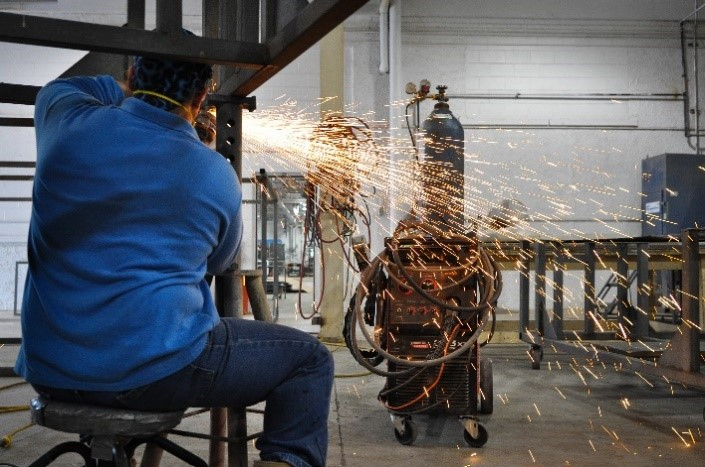History and overview of CORCAN
History of CORCAN and the evolution of prison industries
Correctional industries play an important role in the daily operation of correctional institutions and the reintegration of offenders to the community. They particularly provide interventions that help offenders to address their correctional plan and meaningful daily activities. The role of CSC’s offender employment program has changed significantly since its start. In the 19th century, prison industry was a punishment meant to reform the misguided. In the early 20th century, it was seen as an important component in the rehabilitative process. Today, the employment and employability program, including interventions and services for offenders, contribute to the reintegration of federal offenders. This has a positive impact on public safety.
The ultimate goal of CSC’s offender employment and employability program is to help offenders to find and maintain employment in the community by building important skills, including providing:
- technical, transferable, and essential skills
- job search services
- employability services
This helps offenders:
- reintegrate into the community, and
- find and keep employment while under community supervision
The start of prison industries
Prison industries in Canada have been around for as long as penitentiaries have been. In the 1830s, as the population of Upper Canada was growing, so too was the need for increased law and order.
Governments of the day strongly believed that hard work:
- was a significant contributor to an inmate's rehabilitation
- allowed inmates to develop the habits necessary to successfully return to society
As the country built new penitentiaries, each incorporated space for inmate workshops. Several also developed farms to supply food to the penitentiaries, and provide work opportunities to inmates.
In his 1842 work, American Notes for General Circulation, Charles Dickens comments on his travels through North America. He makes the following observations about Kingston Penitentiary during his stop in that city.
"There is an admirable jail here, well and wisely governed, and excellently regulated in every respect. The men were employed as shoemakers, rope-makers, blacksmiths, tailors, carpenters, and stonecutters; and in the building of a new prison, which is pretty far advanced towards completion. The female prisoners were occupied in needlework."
Kingston Penitentiary completed construction in 1835, due in part to inmate labour. At the time, labour was thought to:
- serve as punishment to inmates, and
- be an essential element to the operation of a penitentiary
Kingston Penitentiary became a major centre for industry in the area. It sold labour services to private businesses, such as cabinetmakers and stonecutters. In addition, farming occurred both inside and outside the walls.
The use of prison labour at the time was not without controversy. Tradesmen in the area were concerned that prison labour would bring about a loss of social status, and hold back economic development in the area.
The construction of penitentiaries continued at a great rate from late 19th century to early 20th century. It also included the creation of shops to employ inmates in a variety of industries, including:
- farming
- carpentry
- machine shops
- auto repair
- stonecutting
- shoe making
- printing

Dorchester Institution Shoe Shop, circa 1925
As the correctional system evolved, the focus on labour shifted from a form of punishment toward vocational training and industry as rehabilitation. By 1951, the correctional system determined that social work and psychology were valuable to offenders’ reintegration.
To ease offenders back into society, CSC adopted new approaches to rehabilitation and reintegration throughout the 1960s. By 1966, the Treasury Board approved a plan to integrate vocational training into industrial activity. This new approach allowed inmates to leave the institutions for short time periods for work or to attend school and return to the facilities in the evenings. Collins Bay Institution in Kingston, Ontario introduced the first gradual release program.
During the 1970s, CSC underwent a series of reforms to the correctional system. These reforms saw the death penalty abolished in 1976 and the classification of offenders and institutions according to medium and maximum levels of security.
A new concept
One afternoon in 1960, a man with a lunch bucket in his hand knocked on the gate of the B.C. Penitentiary. He claimed to be an inmate, and demanded to be let back in. The bewildered guard refused to open the gate until he was assured by someone in authority that the man was indeed a legitimate guest of the institution; he was simply returning from his first day at an outside job. Someone had neglected to tell the turnkey about the new program of day parole.
The creation of CORCAN
In 1980, CSC launched the CORCAN trademark as part of the CSC correctional industry program. In 1992, the government approved CORCAN as a special operating agency (SOA). Because of this new status, CORCAN began to:
- strengthen partnerships with private sector firms
- build capacity for program delivery utilizing revenue reinvestment
- increase opportunities for other government departments to contribute to priorities through acquiring from or partnering with CORCAN
The result for inmates was:
- more realistic working conditions and scenarios, and
- increased responsibilities for both staff and inmates
As CORCAN evolved its operations and practices, offenders:
- gained valuable trade experience, and
- learned useful life skills

Mechanical garage at Kingston Penitentiary, 1962
1990 to present
- 1990: CORCAN begins the process of getting International Organization for Standards (ISO) certification.
- 1991: Moncton workshop becomes the first community industry.
- 1992: The Treasury Board approves CORCAN as a Special Operating Agency.
- 1992: CORCAN reconfigures operations into four business lines:
- agriculture
- manufacturing
- services
- textiles
- 1992: National warehouse and distribution centre opens in Kingston, Ontario.
- 1994: CORCAN expands to add a fifth business line, construction.
- 1998: CORCAN moves the National Engineering and Technical Services Centre from Montreal to Laval, Quebec.
- 2000: CORCAN commences collaboration with Habitat for Humanity.
- 2000: CSC establishes employment coordinator functions in each region and later transfers them to CORCAN responsibility.
- 2006: CORCAN develops and launches the National Employability Skills Program (NESP) in collaboration with Conference Board of Canada, which includes a curriculum for men and another for women.
- 2009 to 2011: Penitentiary farms close across the country and CORCAN implements new initiatives.
- 2012: CORCAN signs a national memorandum of understanding for ongoing partnership with Habitat for Humanity.
- 2015-16: CSC fully integrates responsibility for vocational training within CORCAN.
- 2017-18: Indigenous Offender Employment Initiative commences implementation in the Prairie Region.
- 2018: Saskatoon Community Industry opens in Saskatoon, Saskatchewan.
- 2018: Penitentiary farms reopen, reimplementing the CORCAN agriculture business line, at Collins Bay and Joyceville Institutions.
- 2018: Community industry commences for client installations in the Quebec Region.
- 2019: Edmonton Community Industry opens in Edmonton, Alberta.
- 2019: National Employment Skills Program for Indigenous offenders launches, which includes curriculums for Indigenous men and Indigenous women developed in collaboration with three Indigenous organizations.
- 2019: Community industry activities commence for client installations in the Prairie and Ontario Regions.
- 2020: Community industry activities commence for client installations in the Atlantic Region.
- 2020: CORCAN Kingston location integrates the community based training and transitional employment program to include full CORCAN program and services at location, under the umbrella of the Kingston Community Industry:
- warehouse
- inventory management
- installations
- design
- sales, and
- administrative offices
CORCAN today
Approximately half of incarcerated offenders have high or moderate employment and/or education needs. CORCAN contributes to offender rehabilitation by providing correctional interventions throughout their sentence including:
- employment related training, including on-the-job and vocational training
- employability skills
- a range of employment services including transitional employment to help them find and maintain a job once they are released
Research shows that offenders who find jobs in the community are more than three times less likely to return to CSC’s custody.
Besides other elements of the offender employment and employability program, CORCAN currently provides on-the-job training to offenders in both correctional institutions and community environments. CORCAN-operated industries offer training under five business lines:
Products and services delivered through CORCAN on-the-job training sites generate revenues. CORCAN fully reinvests these revenues in its employment and employability program to:
- sustain
- expand, and
- upgrade interventions to offenders
Learn more about CORCAN products and services at:
Manufacturing

Most of CORCAN's manufacturing shops are ISO-certified and have industry standard machinery and equipment. They successfully generate high volumes of quality-manufactured goods while providing offenders with meaningful employment opportunities and training. They manufacture a wide range of standard products, such as:
- workstations and systems furniture
- ergonomic office seating and accessories
- dormitory furniture (for example, beds and mattresses)
- reception furniture
- metal lockers and shelving
- custom wood and metal products
Textiles
CORCAN's textile operations use private sector standards and methods. They produce a wide range of high quality textile products in well-equipped, ISO-certified shops. CORCAN provides offenders with opportunities to develop skills in all aspects of tailoring and garment creation. Offenders also learn skills covering a range of complexity, through the production of various items like:

- clothing:
- jogging pants
- jeans
- winter jackets
- thermals
- t-shirts
- sweatshirts, and
- work smocks
- uniforms and other tailored work clothing
- bedding
- towelling
- drapery
- pillows
- webbed canvas articles
- canvas and tarp products:
- sewn and radio frequency (RF) welded
- washable face masks and gowns
- custom textile products
In addition to these standard products, CORCAN's textile operations can custom design and deliver products that meet specific client needs, such as our fire retardant fleece blankets.
Services
CORCAN's services line covers a wide variety of on-the-job training activities including:
- laundry services
- decommissioning and recycling of automotive parts
- refurbishing military vehicles
- electronics assembly and testing
- printing (including forms and file folders)
- laser engraving
- vinyl signage
- silk-screened clothing
- tote bags
Construction
At CORCAN construction worksites, experienced tradespeople provide offenders hands-on construction experience and training. Offenders learn by using industry standard equipment and techniques. CORCAN is able to offer a wide range of services that match private sector capabilities and quality, including client-specific designs. Although the projects vary in scope, offenders learn skills in a variety of construction related areas, including:

- framing and drywall
- modular and ready-to-move construction
- plumbing
- electrical
- masonry
- roofing
- window replacement
- exterior siding refinishing and replacement
- concrete sidewalk and truss repairs, forming, and rebar
- onsite new building construction
- renovation
Agriculture
In 2018, the Government of Canada announced the reopening of the penitentiary farms at Joyceville Institution and Collins Bay Institution in Kingston, Ontario. This was a new beginning for the penitentiary farm program. It incorporates a variety of agriculture activities that represent a broad scope of the Canadian agriculture sector. The program offers meaningful opportunities that support offenders in their rehabilitation and reintegration.

Offenders may participate in a variety of activities at the two sites, or via micro-incubators or initiatives at other locations including:
- building and renovating the necessary infrastructure
- livestock operations
- crop production and other land-based initiatives
- horticulture
- honeybee keeping
- maple syrup production
- apple orchard maintenance
- environmental activities, including green zone and forestry maintenance
Page details
- Date modified: